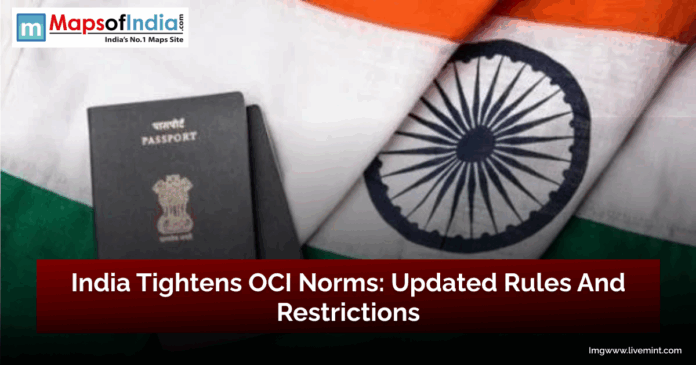The Overseas Citizenship of India (OCI) card has been a preferred and special route for the Indian-origin foreign nationals to establish a solid bond with India. It gives holders a lifetime, multiple-entry visa, right to live and work in India, as well as a few economic and educational privileges. But in August 2025, the Indian government brought dramatic narrowing of the OCI norms, especially regarding grounds of cancellation. The current blog provides detailed information on the new rules, legal protection, and the consequences for OCI holders.
What Is an OCI Card and What Privileges Does It Offer?
Launched in August 2005 as a part of an amendment to the Citizenship Act, the OCI status provides foreign nationals of Indian origin lifetime access to India without a visa. It confers:
- Visa-exemption permanent residence;
- No need for registration with FRRO, however long they stay-except in case of a change in permanent address or occupation;
- Equality with NRIs in the majority of economic, monetary and educational aspects;
- Rights to possess residential or commercial premises (and farm lands and farm houses excluded);
However, it does not provide citizenship, the right to vote, eligibility to government employment or appointment to constitutional offices.
Key Update: Tightened Cancellation Grounds (Aug 2025)
In an August 2025 Gazette notification under Section 7D(da) of the Citizenship Act, the Ministry of Home Affairs (MHA) extended the reasons used to cancel OCI:
- As soon as a holder of OCI is pronounced guilty of at least 2 years in jail,
- Their OCI status can now be cancelled anytime they are charge-sheeted in an offence that carries a penalty of 7 years or more- previously, their OCI status could only be cancelled within five years of being registered.
Historically, reasons such as fraud, security threats, or acts that are prejudicial to national interest were grounds to cancel past grounds, but these new rules create certainty regarding the permanence of criminal-related cancellations.
Legal Safeguards: Fair Process Guaranteed
Nevertheless, the procedural fairness is also preserved despite the novel reasons. The Citizenship (Amendment) Act 2019 introduced an amendment to an existing section 7D, providing that by no order made under this section shall an OCI registration be cancelled unless the OCI has been given a reasonable opportunity of being heard. The emphasis in courts is that cancellation decisions should involve the transparent expression of the legitimate reasons and involve the requirement of fairness.
It is notable that in another case of academic Ashok Swain, the Delhi High Court cancelled the order of cancellation of OCI registration, upholding the importance of due process in a case.
Other Long-standing Rules OCI Holders Must Follow
Permissions Required
OCI holders should obtain in advance a sanction from the Ministry of Home Affairs or the Foreigners Registration Office:
- Scientific/missionary works;
- Journalistic work;
- Entering restricted or protected territories;
- Mountaineering, foreign missions as an intern or other sensitive missions.
Property Ownership
An Indian visa by OCI allows its holders to purchase a house or commercial building. However, they are not allowed to buy agricultural land, plantations or farm houses-the only exception is when they inherit it.
FRRO Registration
All OCI card holders need not be registered under FRRO, no matter how long they stay in India, as long as there is no change in permanent address or occupation.
Employment and Political Rights
OCI card holders cannot access government employment in India or constitutional positions, or cast a vote-they are aliens, not nationalists.
What the Changes Mean for the Indian Diaspora
The August 2025 update sustains that the OCI scheme is a privilege rather than a right. It serves to make sure that people who have committed grave criminal offences cannot take advantage of the OCI.
- The policies are also open and liberal to the majority OCI holders, barring all carve-outs consisting of students, professionals, as well as families.
- In individuals charged or convicted of misdemeanour or felony offences, the changes increase the stakes-and the necessity to be compliant.
Practical Recommendations for OCI Holders
- Stay updated — Sometimes keep an eye on legal announcements and policy changes, via government websites.
- Monitor conduct — Do not engage in criminal acts, particularly when the act is severe to result in fines or jail time.
- Attend hearings if notified — The procedural fairness will entail serving a show-cause hearing to the government, followed by an opportunity to respond to the cancellation.
- Apply for permissions early — When researching or writing, or in a sensitive area.
- Avoid buying restricted properties — Do not purchase zoned houses/land, agricultural land or farm houses unless it is a familial inheritance.
- Inform authorities of key changes — FRRO/MHA has to be informed of any change of address or occupation.
- Seek legal help if needed — Particularly when it threatens to be cancelled, procedural rights in court are enforceable.
Conclusion
The OCI card that India offers is one of the most significant methods by which the global diaspora is in touch with the homeland. However, through the August 2025 reforms, one can tell that the government aims to protect the integrity of this privilege.
Explaining grounds of cancellation, ensuring fair process, and ensuring the ground rules of long-standing use, the renewed framework delivers a middle ground between the need to make relations with the overseas Indians and safeguarding national interests. OCI still has the potential to remain an effective bridge and not a burden, with the appropriate level of awareness and compliance.




